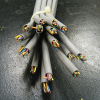I sort of left the hobbyist electronics world back in 2018, and now everything seems to have an embedded Raspberry Pi in it. What's the best way to catch up?
I’m an EE by trade focusing on embedded devices, but most of my work is in relatively low-power STM32 applications. When I stopped following developments in hobby kits, it was mostly Arduino Unos slowly driving I2C OLED displays.
Now suddenly, there are embedded Raspberry Pis and ESP32s doing realtime facial recognition and video feeds.
Is there a good place to look to catch up on what’s now possible with these embedded devices?
Also, while I enjoy the ease of the hobby kits, I’m also interested in more mass-production-focused solutions.



Add comment